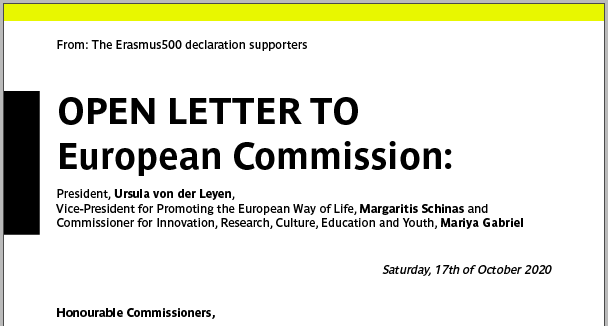We come to you today with a simple request: we ask you to be champions for an Erasmus+ programme that allows for the participation of many more students from all walks of life!
Since many years, researchers have shown that the single largest obstacle to participation in international student mobility is the additional financial burden associated with living abroad. Current grants have not kept up with soaring rent prices, and in the vast majority of countries receiving financial support from the family is a pre-requisite for being able to participate in a programme like Erasmus, which means that students from disadvantaged socio-economic backgrounds are underrepresented. Meanwhile, approximately half of all European students work while they study, and those who rely on that income to meet their living expenses also find themselves structurally excluded from enjoying such life-changing opportunities.
The current pandemic has already brought a new wave of inequalities to the education sector. As we stand on the edge of yet another daunting social and economic crisis, we ask you to make sure that the next Erasmus programme is genuinely inclusive – and there is a disarmingly simple manner to partially achieve this goal.
Since last April, dozens of universities, student and stakeholders organisations have joined forces to support the notion that all European students should receive a monthly Erasmus+ grant of at least 500€. This would:
- Replace an unintelligible grant system with something far simpler, fairer, and transparent: 98% of all students studying abroad with Erasmus+ would receive more and better financial support, which is of crucial importance when we know that during the economic crisis the ability of families to financially support students in affording such experiences can be severely curtailed;
- Radically simplify administration, reporting and auditing requirements, engendering considerable systemic savings; having mobility as a triggering event for funding means a single documental proof would be required;
- Strongly emphasize how all citizens of the Union have comparable rights and opportunities.
We believe all political leaders would in principle be favourable to higher grants, the question being where to find the resources to do so. The Erasmus500 proposal already takes into account the outcomes of the MFF negotiation and the latest mobility modalities that will be introduced from 2021 onwards, combining them in such a way that, according to the latest statistical data published by the European Commission, would very nearly suffice to attain such an ambitious leap forward!
Through this letter, we speak to you on behalf of hundreds of supporters, ranging from Erasmus alumni in the furthest corners of our continent to the French and Spanish Rectors Council, that feel this is a central challenge for the future of Europe and of one of its most beloved flagships programmes. By acting decisively together we can make sure mobility will benefit many, instead of a privileged few.
We would be honoured to have the opportunity to discuss this matter with you and illustrate how the existing Erasmus grant system could be reliably reengineered. We count on your political leadership to make such a change possible, seizing a historical opportunity to make the programme a reality for every European student.
The Erasmus500 declaration supporters.
Open Letter to the European Commission I PDF


